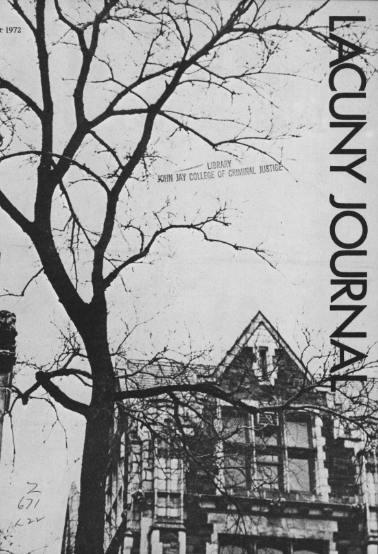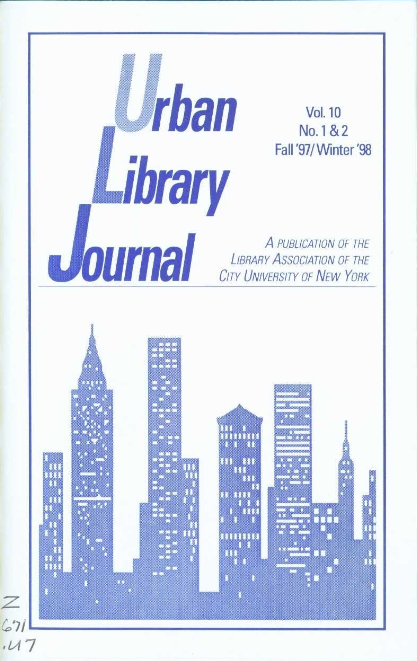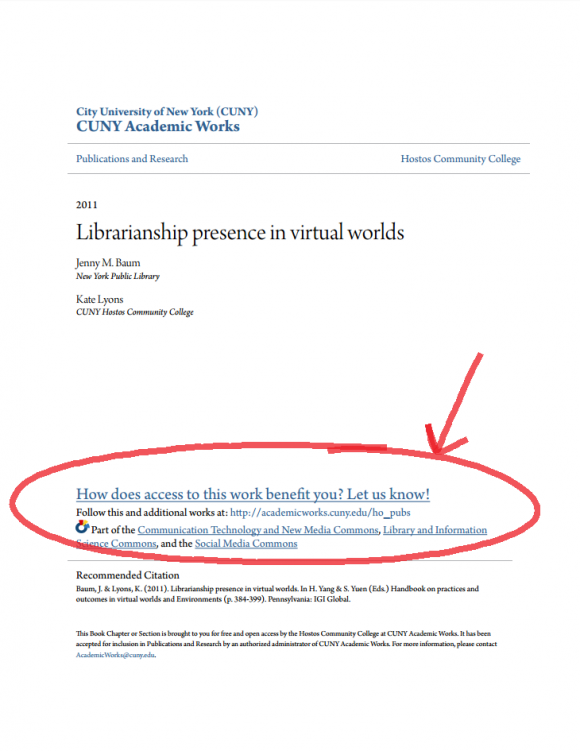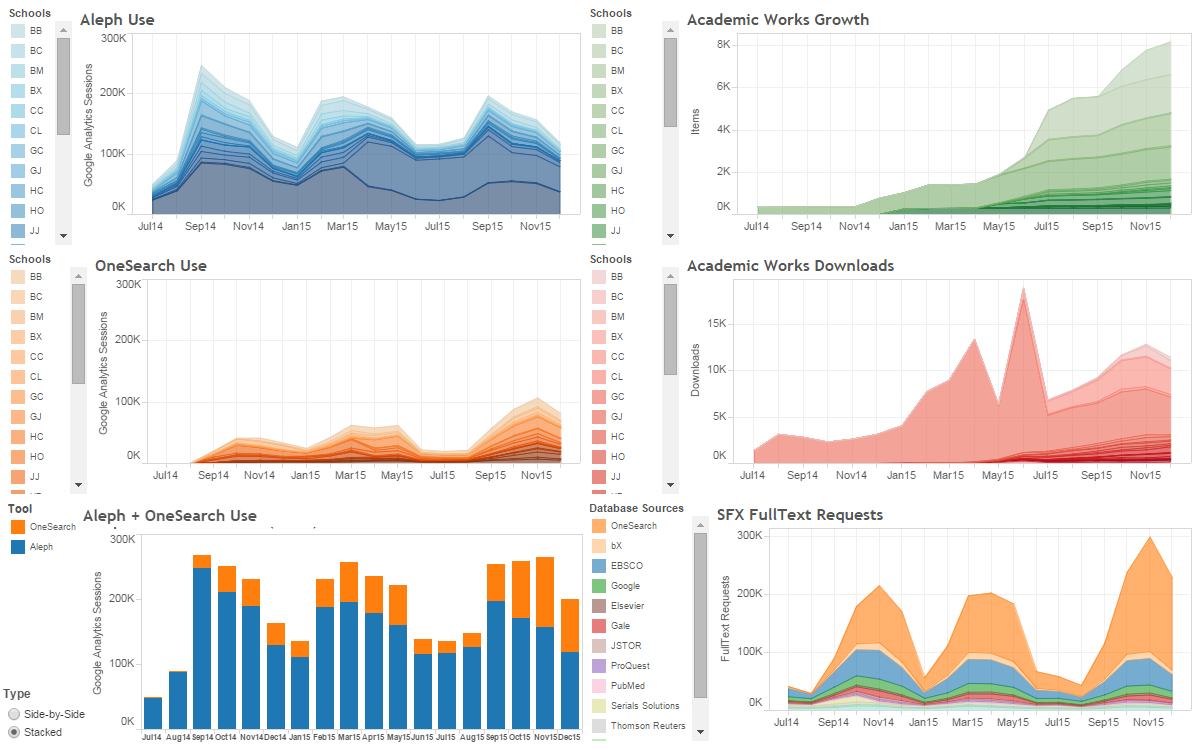Home » Academic Works (Page 3)
Category Archives: Academic Works
Urban Library Journal launches in Digital Commons
The Office of Library Services is thrilled to announce the launch of Urban Library Journal on Academic Works’ Digital Commons platform. Published by the Library Association of the City University of New York (LACUNY), Urban Library Journal (ULJ) fills a gap in LIS scholarship by addressing the work of libraries and librarians in an urban setting.
Before it was Urban Library Journal
 In 1972, LACUNY launched its first journal, LACUNY Journal, as a means to make “the ideas of CUNY librarians known to each other and to colleagues in other departments of City University.” The Editorial Committee hoped to address a full range of subjects and perspectives – including controversial ones – in order to promote a free and open exchange of ideas and raise the professional goals of its membership. And it did just that. From profiles of CUNY libraries and librarians to articles about the relationship between libraries and open admissions to questioning the role ACRL plays in bringing libraries together, Volume 1, Issue 1 was a platform for the diverse voice, experiences, and perspectives present throughout CUNY Libraries.
In 1972, LACUNY launched its first journal, LACUNY Journal, as a means to make “the ideas of CUNY librarians known to each other and to colleagues in other departments of City University.” The Editorial Committee hoped to address a full range of subjects and perspectives – including controversial ones – in order to promote a free and open exchange of ideas and raise the professional goals of its membership. And it did just that. From profiles of CUNY libraries and librarians to articles about the relationship between libraries and open admissions to questioning the role ACRL plays in bringing libraries together, Volume 1, Issue 1 was a platform for the diverse voice, experiences, and perspectives present throughout CUNY Libraries.
In 1981, the LACUNY Journal was replaced by the Urban Academic Librarian, which expanded its scope and the conversation beyond CUNY, to librarians working in an urban academic setting. Michael O’Donnell, Chairperson of the LACUNY publications committee and a librarian at the College of Staten Island, introduced the first issue of this new publication with a call for change:
As the 1980s unfolded, urban academic librarians need to redefine their mission in order to achieve a balance between the academically desirable and the fiscally and physically feasible. By rejecting both the starry-eyed idealism of the Sixties and the “looking-out-for-number-one” cynicism of the Seventies, perhaps we can establish realistic and achievable goals. We hope this journal will help provide a free exchange of ideas.
Launch of Urban Library Journal
I n changing the name to Urban Library Journal in 1998, the members of the LACUNY publications committee opened the journal to all librarians working in an urban environment. The city, its institutions, and its people were under attack from politicians, their policies and their budgets. Editor Rolando Perez introduced the first issue under the journal’s new name by addressing the importance of its expanded scope:
n changing the name to Urban Library Journal in 1998, the members of the LACUNY publications committee opened the journal to all librarians working in an urban environment. The city, its institutions, and its people were under attack from politicians, their policies and their budgets. Editor Rolando Perez introduced the first issue under the journal’s new name by addressing the importance of its expanded scope:
“No true American lives in New York City,” commented Ronald Reagan while in office — a comment that though easily dismissed did set the tone for a certain attitude towards our cities. . .
This attitude, though somewhat tempered in the 90s, still domineers a lot of federal, state, and even local politics with respect to our cities. And though no politician today would make the same statement made by Reagan almost twenty years ago, a lot of the legislation that impact upon our cities, does reflect the unstated attitude of our politicians. It is reflected in the way our public education institutions have come under rhetorical and economic attack, it is reflected in the lack of funding for educational programs, and it is reflected in our elected officials’ attitudes towards the very institutions that support the cities, as for instance, our urban libraries.
As former co-editors Beth Evans and Sally Bowdoin note “shortly after the name change [to ULJ] the LACUNY publications committee began to recruit editorial board members outside of CUNY. In 2003, an advisory board of nationally recognized librarians, including E. J. Josey, University of Pittsburgh, James C. Welbourne, Enoch Pratt Free Library, and Neerejana Ghosh, New York School Library System, was established.”
ULJ became an online-only, open access publication in 2007 when it moved to the Public Knowledge Project’s Open Journal System. With this change, all urban librarians could not only submit to the journal, they could read it as well.
Urban Library Journal in Digital Commons

In moving to the Digital Commons platform, ULJ joins the larger Academic Works initiative at CUNY, or, to be more accurate, CUNY joins ULJ in the larger open access movement. It also marks the first journal to be published and supported by the Office of Library Services, a service we hope to grow in future years.
Under the leadership of editor Junior Tidal (City Tech), and with the deft support of web manager Valerie Forrestal (College of Staten Island), archived issues of ULJ dating back to 2007 have migrated to the new platform. As part of this process, Tidal and a LACUNY subcommittee comprised of Margaret Bausman (Hunter College), Mark Eaton (Kingsborough Community College), Charles Keyes (LaGuardia Community College), and Jessica Wagner (Baruch College) selected a new logo as part of a design contest hosted by Logosauce.com.
In addition to the visual redesign, ULJ worked with the Office of Library Services to make its policies and procedures more transparent to its readers and contributors. ULJ and the Office of Library Services thank the Journal of Librarianship and Scholarly Communication and its editors for providing permission to adapt its documentation.
The Office of Library Services is pleased to support Urban Library Journal as it moves forward, on its new home on Digital Commons.
How To | Dynamic feedback links in Digital Commons documents
At the beginning of this year, we announced a new feature in our institutional repository: a feedback form. It’s used to gather input from users of the repository to understand how access to these works benefits them:

If you’re running a repository using bepress’s Digital Commons and want to implement this feature, read on!
(more…)
New Feature: How does access to this work benefit you?
Open access advocates, myself included, often talk about public scholarship for the public good. Open access advances the pace of scientific progress, promotes interdisciplinary research and collaborations, and allows researchers to share their work with those who don’t otherwise have access to it. We’ve all had the experience of hitting a paywall, and it’s not hard to believe that members of our local and global communities do too.
The Budapest Open Access Initiative, regarded as one of three declarations that defined and shaped the movement, establishes the public good as the foundation for open access:
An old tradition and a new technology have converged to make possible an unprecedented public good. The old tradition is the willingness of scientists and scholars to publish the fruits of their research in scholarly journals without payment, for the sake of inquiry and knowledge. The new technology is the internet. The public good they make possible is the world-wide electronic distribution of the peer-reviewed journal literature and completely free and unrestricted access to it by all scientists, scholars, teachers, students, and other curious minds. Removing access barriers to this literature will . . . lay the foundation for uniting humanity in a common intellectual conversation and quest for knowledge.
But who is the Public? How does CUNY Academic Works benefit them? We want to know!
Working with the team at Digital Commons, the Office of Library Services set-up a new feature in Academic Works: a feedback form. PDF cover pages in select series now include a question: “How does access to this work benefit you? Let us know!” Readers that click the hyperlink are directed to a feedback form that asks for some basic information as well as permission to publicly share their comments.
Before rolling it out across the repository, this feature was tested on a collection of dissertations at the Graduate Center. Monthly usage reports let us know this content gets a lot of attention, but who is downloading and reading it? How does it contribute to the public good? I can’t tell you about each download, but I can now tell you how open, public access to “The Contributions of Earl “Bud” Powell to the Modern Jazz Style” benefit one person:
I am a 52 year old engineer who has been playing jazz piano since the age of 10. I am delighted to find this thesis about one of the most important jazz pianists of the 20th century. It includes the *incredible* transcription of “Strictly Confidential,” an amazing piano piece by legendary jazz pianist Bud Powell. I have been looking for a transcription for this piece my entire life, as it is far too complicated for me to hear with my basic ears…
This is the first of what I expect to be many stories that demonstrate the benefits of open access to the public. Future feedback will be relayed to campus repository administrators and posted to Open Access @ CUNY when permissions allow.
Analytics: Meet the OLS Dashboard
Here it is: version 2.0 of our new OLS Dashboard:
You can enter the OLS Dashboard from the link above or go directly to a full view of any of the included graphs via the links below:
Information about the source data for each of the graphs is displayed at the bottom of the individual graph page, not on the overview/dashboard page.
Try these features:
- Click on a legend point in any of the graphs. This will offer a popup window with 2 options: “Keep Only” and “Exclude.” Selecting one of these options will filter the information only in this single graph, changing it to display only the selected data. Note, however, that the static 0-300K vertical axis makes it difficult to see individual school data.
- There is an “Undo” option at the bottom-left of the page to remove a single filter action. Use the “Reset” option to remove multiple filtering steps at once.
- Double-click on any graph to zoom in on the data. Once that is done, a “Home” button appears to take you back to the original view. The “Undo” and “Reset” buttons also work on these changes.
OLS is currently using Tableau Public’s free service to bring you this information. (Check the Tableau Public Status page if you can’t get to our OLS Dashboard.)
[Note that this blog post was updated on 27 April 2016 to point to v2.0 of the OLS Dashboard. The image at the top is still the original v1.0 OLS Dashboard.]
Analytics: Getting to Know Our Users
Who is using OLS systems like the CUNY Catalog (Aleph), OneSearch, Academic Works, and this blog? What devices are being used to access our sites?
OLS wants to provide these and many other valuable answers. Most of the OLS library systems have some built-in reporting ability. Unfortunately, these systems are separate silos of information, not easily related to each other. In April 2015, OLS standardized use of Google Analytics (GA) on all platforms. We will be reporting on the information provided by GA and from the other, product-specific sources in future blog posts. The data provided below reflects GA data from April though December 2015.
So, now that we have all that data: Who are our visitors?
Language = English
99% CUNY Catalog (Aleph)
98% OneSearch
87% Academic Works
At Academic Works, these international uses are well distributed. The languages that reach 1% are: Chinese 2%; Spanish 2%; French 1%; German 1%, and Russian 1%.
33% Blog
Blog reader languages are, in fact, unclear because it has a high percentage of “unknown” language readers: 57%. The only other language over 1% is Russian at 9%.
Location = USA
99% CUNY Catalog (Aleph)
99% OneSearch
47% Blog
Blog reader locations are better reported than languages because the percentage of “unknown” locations is only 15%. The locations that reach 2% are Russia (12%), China (3%), and Japan and Germany at 2%.
***Academic Works — Deriving correct location information for Academic Works is a work in progress.
All Platforms
From where do our users do their searching?
Aleph OneSearch AcadWorks OLS Blog Desktop 96% 88% 85% 87% Tablet 2% 4% 4% 1% Phones 2% 8% 11% 12%
Browser (top 4)
Chrome 23% 45% 47% 68% Firefox 57% 19% 22% 12% I E 10% 15% 11% 5% Safari 10% 20% 16% 13%
OS, All (top 5)
Android 0% 3% 5% 1% IOS 2% 7% 9% 12% Linux 42% 1% 1% 1% Mac 16% 28% 22% 57% Windows 39% 61% 62% 26%
Mobile (tablet + phone)
Mobile Devices (top 5)
iPad 45% 29% 19% 4% iPhone 13% 25% 41% 89% Galaxy S5 2% 3% 2% 0% Unknown 23% 18% 9% 2% Win Tablet 6% 5% 1% 0%
Mobile OS (top 3)
Android 13% 24% 33% 5% IOS 58% 54% 60% 93% Windows 29% 22% 4% 1%
We’re in the process of building an analytics dashboard, so our next analytics post will include a link to the OLS Analytics dashboard.
If you’re interested in CUNY library analytics, be sure read Roland’s blog post: Impact of Primo on SFX


